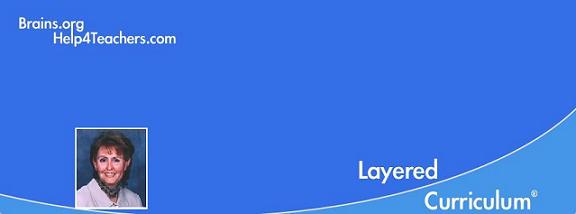__________Layered Curriculum®. . . because every child deserves a special education™_
SAMPLE Layered Curriculum Lessons ___||___
BOOKS
& Training Kits ___||___
TIPS from teachers
___||___ Kathie's
CALENDAR___||___
HOW-TO ARTICLES & Videos
On-site
WORKSHOPS & Conferences
___||___ Kathie's
NEWSLETTER ___||___
Today's Hot Topics____||___
The PARENT'S Corner _||___
CONTACT Us & FAQ's
 |
![]() _
_ ![]()
Layered
Curriculum TEXT & WORKBOOK
Set
for only
$43.95
(free shipping in
US)
Teaching Reading
Nanci Ross
Instruction Based on Research on How the Brain Learns
Neuroscience research has found that there is a potent combination of elements that lead to efficient learning of new tasks and concepts:
Frequency
Intensity
Cross-training
Adaptivity
Motivation and attention
Frequency
For the brain to build and strengthen the pathways needed to lean a new skill, the student must be repeatedly exposed to the material. Daily practice of a particular skill can bring about true accomplishment. Learning to read is no exception; studies have shown that the more a person reads, the better that person will be reading at any age and at any level of reading proficiency.
Intensity
Learning a new skill requires concentrated practice. Intense focus on a new skill allows the learner to build neural support for that skill in a short amount of time. When you train for anything half-heatedly, you are never able to receive the full effects of acquiring that skill. Reading skills are similar; the student must focus on the foundational skills critical to reading in order to become a proficient reader.
Cross-Training
Cross-training students on a wide range of skills reinforces the students overall comprehension. Just as good nutrition requires many different types of foods at each meal, accomplished reading requires that the student be simultaneously proficient in many different skills.
Adaptivity
Adaptivity is a special feature of specialized reading instruction. It involves instruction that adapts to the student's incoming reading level. It is vital that the teacher understands each individual's reading level, in order to adapt the training material to meet their specific needs. This flexible approach ensures that the student is challenged but not frustrated, which in turn ensures that the student continues to pay attention, as well as continues to learn and progress.
Motivation and Attention
Motivation keeps students interested in paying attention to the material and maintaining frequency of training. Instructional programs that offer several different motivational strategies keep students interested, and motivation to continue is reinforced.
Nanci Ross is a reading specialist in Salt Lake City, Utah.
Copyright © 1998 - current year by Kathie F. Nunley.
All Rights Reserved.
Layered
Curriculum is a registered trademark developed by
Dr. Kathie F. Nunley.